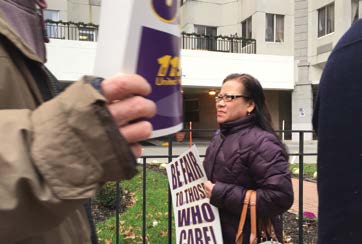Alaris Health Violated Federal Law, Labor Board Finds
February 21, 2019

Alaris Health, one of New Jersey’s largest nursing home chains, operates nearly 20 facilities in Hudson, Essex, Bergen, and Union counties. Between 2013 and 2017, the most recent years where data is available, Alaris nursing homes earned a combined profit exceeding $65 million dollars, according to data from Centers for Medicare and Medicaid Services. Most of its revenue comes from public sources, Medicaid and Medicare.
For the past five years, some 450 caregivers have been in a labor dispute with Alaris over the terms of new union contracts. Workers are seeking basic improvements, including affordable family health insurance, improved staffing levels, and higher wages. Many workers earn less than $23,000 a year.
Alaris facilities were found guilty of various illegal actions including coercively interrogating and threatening workers, engaging in illegal surveillance of workers, retaliating against workers for union activity, and refusing to bargain in good faith with their union.
Back in September, 2014, caregivers at four Alaris homes went on a three-day strike after the management at the facilities committed a number of unfair labor practices (ULPs) against them, including threatening and interrogating employees and obstructing their legally-protected right to bargain over their working conditions.
Workers at the four facilities— Alaris Health at Boulevard East in Guttenberg, Alaris Health at Castle Hill in Union City, Alaris Health at HarborView in Jersey City, and Alaris Health at Rochelle Park in Rochelle Park—lauded the NLRB’s decision. All four facilities violated federal law in refusing to allow members back on the job after they unconditionally agreed to return to work when the strike ended. The facilities were ordered to compensate affected employees and to cease and desist from refusing to bargain in good faith with the Union.
These rulings affirm and add to a litany of legal decisions in recent years where Alaris facilities were found guilty of various illegal actions including coercively interrogating and threatening workers, engaging in illegal surveillance of workers, retaliating against workers for union activity, and refusing to bargain in good faith with their union. The decisions can be found on the NLRB website.
1199 Magazine | January - February 2019

